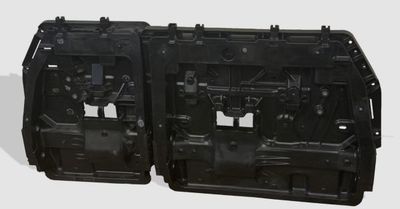2021 Toyota Sienna Looses Weight On BASF Diet
 |
 First-of-its-kind third row weight saving Free-standing seatbacks |
- BASF solution results in 30% weight reduction and 15% cost savings vs prior generation
WYANDOTTE, MI, and Ann Arbor, MI, August 06, 2020 – BASF and Toyota Motor North America Research & Development achieved lightweighting success with the new 2021 Toyota Sienna. The vehicle, scheduled to launch later this year, just won the prestigious Altair Enlighten Award for achievements in vehicle weight savings for reduced mass of the third row seat. In the previous model, the third-row seat was comprised of 15 different steel components, making it very heavy. Toyota wanted the 2021 Sienna’s third seat to be lighter and cost competitive while exceeding all performance criteria. Toyota turned to BASF to help them achieve their lightweighting goal.
“Lightweighting doesn’t always have to be more expensive,” said Todd Muck, from the Toyota Technical Strategic Planning Office at the Toyota R&D Center in Saline, Michigan. “We were able to meet our cost objective and saved 15% compared to the prior generation. The seat is 30% lighter compared to the previous model. We had some great partnerships that helped us achieve these targets, one of which was BASF.”
Traditionally, resin components for seating have had metal reinforcement, which can add more cost to the process. Toyota also wanted an injection molding part that was a shoot-and-ship part – meaning it was made in one piece, without complex and costly post-processing. That’s where BASF’s expertise in materials and design came in. BASF used its unique 35% glass-reinforced and impact-modified polyamide PA6 grade Ultramid® B3ZG7 CR, and its proprietary computer aided engineering (CAE) tool ULTRASIM® which allowed for accurate CAE simulations during the multiple phases of development efforts.
“The third seat design is what I would classify as an enabling technology,” said Matt Parkinson, Manager Applications Development Engineering and Composite Technologies, BASF Performance Materials. “It is the first of its kind in the way it is designed without inserts as a fully injected seat back. One of the challenges was to ensure a high elongation and impact qualities for the crash requirements. At the same time, we focused on strength and stiffness because the seat also serves as a load floor.”
“BASF helped us bridge the challenge gap for this seat back and meet our targets,” said Muck.
Ultrasim and Ultramid are trademarks of BASF SE.
About Performance Materials
BASF’s Performance Materials division encompasses the entire materials’ know-how of BASF regarding innovative, customized plastics under one roof. Globally active in four major industry sectors – transportation, construction, industrial applications and consumer goods – the division has a strong portfolio of products and services combined with deep understanding of application-oriented system solutions. Key drivers of profitability and growth are our close collaboration with customers and a clear focus on solutions. Strong capabilities in R&D provide the basis to develop innovative products and applications. In 2019, the Performance Materials division achieved global sales of €6.06 bn. More information online:www.plastics.basf.com.
About BASF
BASF Corporation, headquartered in Florham Park, New Jersey, is the North American affiliate of BASF SE, Ludwigshafen, Germany. BASF has more than 18,800 employees in North America and had sales of $18.4 billion in 2019. For more information about BASF’s North American operations, visit www.basf.com/us.
At BASF, we create chemistry for a sustainable future. We combine economic success with environmental protection and social responsibility. More than 117,000 employees in the BASF Group work on contributing to the success of our customers in nearly all sectors and almost every country in the world. Our portfolio is organized into six segments: Chemicals, Materials, Industrial Solutions, Surface Technologies, Nutrition & Care and Agricultural Solutions. BASF generated sales of €59 billion in 2019. BASF shares are traded on the stock exchange in Frankfurt (BAS) and as American Depositary Receipts (BASFY) in the U.S. Further information at www.basf.com.


